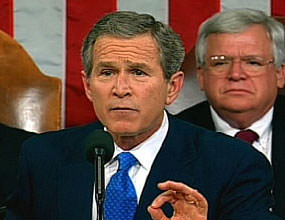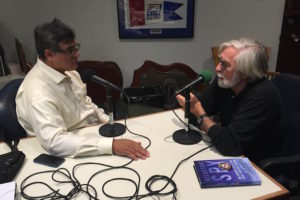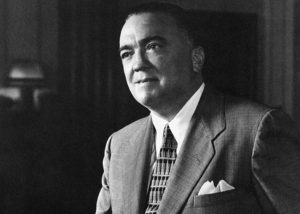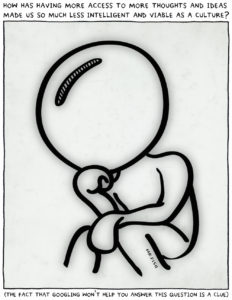Follow the 16 Words
The Washington Post continues to investigate the now infamous 16 words the president used to help make his case for war. It's not surprising to read that the Niger uranium claim was bogus, but it is disconcerting to learn just how many people in the intelligence community knew it all along.
The Washington Post continues to investigate the now infamous 16 words the president used to help make his case for war. It’s not surprising to read that the Niger uranium claim was bogus, but it is disconcerting to learn just how many people in the intelligence community knew it all along.
Your support matters…Washington Post:
It was 3 a.m. in Italy on Jan. 29, 2003, when President Bush in Washington began reading his State of the Union address that included the now famous — later retracted — 16 words: “The British Government has learned that Saddam Hussein recently sought significant quantities of uranium from Africa.”
Like most Europeans, Elisabetta Burba, an investigative reporter for the Italian newsweekly Panorama, waited until the next day to read the newspaper accounts of Bush’s remarks. But when she came to the 16 words, she recalled, she got a sudden sinking feeling in her stomach. She wondered: How could the American president have mentioned a uranium sale from Africa?
Burba felt uneasy because more than three months earlier, she had turned over to the U.S. Embassy in Rome documents about an alleged uranium sale by the central African nation of Niger. And she knew now that the documents were fraudulent and the 16 words wrong.
Nonetheless, the uranium claim would become a crucial justification for the invasion of Iraq that began less than two months later. When occupying troops found no nuclear program, the 16 words and how they came to be in the speech became a focus for critics in Washington and foreign capitals to press the case that the White House manipulated facts to take the United States to war.
Dozens of interviews with current and former intelligence officials and policymakers in the United States, Britain, France and Italy show that the Bush administration disregarded key information available at the time showing that the Iraq-Niger claim was highly questionable.
In February 2002, the CIA received the verbatim text of one of the documents, filled with errors easily identifiable through a simple Internet search, the interviews show. Many low- and mid-level intelligence officials were already skeptical that Iraq was in pursuit of nuclear weapons.
Independent journalism is under threat and overshadowed by heavily funded mainstream media.
You can help level the playing field. Become a member.
Your tax-deductible contribution keeps us digging beneath the headlines to give you thought-provoking, investigative reporting and analysis that unearths what's really happening- without compromise.
Give today to support our courageous, independent journalists.





You need to be a supporter to comment.
There are currently no responses to this article.
Be the first to respond.